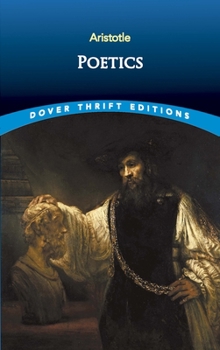Poetics
Select Format
Select Condition 
Book Overview
Among the most influential books in Western civilization, Aristotle's Poetics is really a treatise on fine art. In it are mentioned not only epic and dithyrambic poetry, but tragedy, comedy, and flute and lyre playing. Aristotle's conception of tragedy, i.e. the depiction of a heroic action that arouses pity and fear in the spectators and brings about a catharsis of those emotions, has helped perpetuate the Greek ideal of drama to the present day...
Format:Paperback
Language:English
ISBN:048629577X
ISBN13:9780486295770
Release Date:March 1997
Publisher:Dover Publications
Length:64 Pages
Weight:0.16 lbs.
Dimensions:0.2" x 5.2" x 8.4"
Age Range:14 years and up
Grade Range:Grade 9 and higher
Customer Reviews
5 ratings
Excellent text for intro to theatre course
Published by Thriftbooks.com User , 16 years ago
This translation uses terminology appropriate for teaching the Poetics to beginning theatre students. It is an excellent version for use in a theatre (as opposed to philosophy) class, and the budget price and slim size of the edition make it a fine bargain for students with limited finances. As a theatre teacher of students from middle school to college, I strongly recommend selecting this particular edition and translation of the Poetics for use in discussing the parts of drama in an introductory course.
Aristotle Clearly Explained
Published by Thriftbooks.com User , 17 years ago
By this time, the importance of Aristotle as a philosopher and the first analyst of drama is well known. For budding screenwriters, reading and understand his Poetics is one of the requirements for building good stories. Since I can't read the original in its Attic Greek, good translations are worth their weight in gold. Malcolm Heath's excellent translation is incredible. First, the introduction to the main work is longer than the translation itself. Heath dissects and explains EVERYTHING so that when reading the main work, things are clear. Not satisfied with that, there are notes to the translation as well! One comes away from this work with a crystal clear understanding of the concepts Aristotle teaches. This definitely is my preferred translation of the Poetics. 10 stars!
Poignant Insights
Published by Thriftbooks.com User , 20 years ago
The ancient observer's insights have stood the test of time. Some elements of human nature remain consistent regardless of the century or technology. Aristotle thought classification was important. In this work he sets forth a taxonomy for poetics. One of the more controversial statements he makes in this book is "poetry is both more philosophical and more serious than history." He doesn't leave it at that, being the philosopher he is he goes on to explain himsself. He adds, "poetry speaks more of what is universally the case, whereas history speaks of particular events." This book will give you a comparison that spans cultures and centuries.
Where art theory began
Published by Thriftbooks.com User , 22 years ago
This book (or perhaps just a portion of Aristotle's lecture notes) remains the acorn of an oak of subjects, from art criticism to playwriting to poetry. This is a clear, accurate translation (it helped me pass a test in Ancient Greek; and people who really know assure me). The text is no-frills and the introduction is brief but informative. This is probably not for scholars who will want to quibble over the meaning of 'phusis' and 'techne' but for the general reader who will be infinitely enriched by a philospical masterwork. Unlike other such masterworks, this one is short and readable!
A Classical masterpiece!
Published by Thriftbooks.com User , 23 years ago
Aristotle's Poetics is hailed as the first systematic critical theory in the world. For centuries and centuries, it has inspired writers, critics, and philosophers alike. Aristotle, the father of critics, as many would exalt him, sets the rules for many key literary genres such as Tragedy, Comedy, and Epic. Through comparing and contrasting these classical genres, Aristotle convincingly argues for the highness and greatness of tragedy, as the most mimetic literary genre. Thanks to Aristotle, we are introduced to such eternally important critical terms such as mimesis(imitation), muthos(plot), anagnorisis(discovery), peripeteia(reversal),hamartia(misjudgment), catharsis(purgation). In other words, Aristotle's Poetics is the bible for critics, playwrights, and fans of tragic literature.






